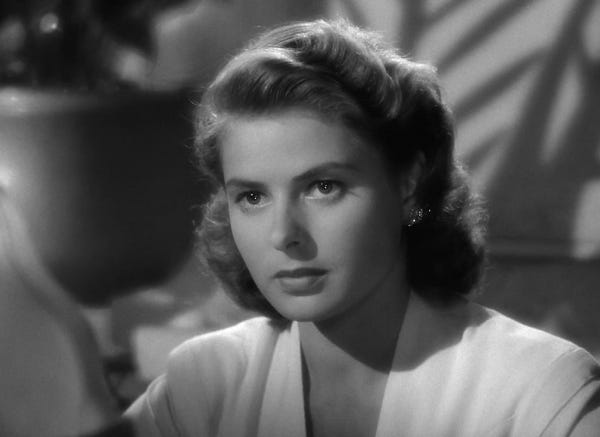#20 - Casablanca (1942)
Of all the gin joints, in all the towns, in all the world, she walked into his
There are a dozen or so films that feel intimidating to talk about, and for me, Casablanca is one of them. Released in 1942, during a time of great uncertainty in the U.S., the film provided a sense of hope that victory was possible.
What stands out most to me after rewatching Casablanca is how lived-in and complex its world feels. The film spends significant time with refugees from all over the world—Germans, Russians, French—who are trapped in Casablanca, all dreaming of escape. One of the most powerful examples of this collective yearning comes during the scene where Nazis begin singing the German national anthem, only for Lazlo to lead the crowd in a rousing rendition of the French national anthem in response. The camera focuses on Yvette, tears streaming down her face, mourning her occupied homeland. Moments like this showcase what makes Casablanca special: even the supporting characters have hopes and dreams that resonate, not just the leads.
Humphrey Bogart delivers a perfect performance as Rick, the rugged bar owner who refuses to take sides in the war. Rick and his bar are the heart of Casablanca, a gathering place for refugees to talk, drink, gamble, and cling to the hope of finding a way out.
Rick’s interactions with his customers are full of punchy, witty dialogue that only seems possible in films from this era. One of the most memorable exchanges is with Yvonne:
“Where were you last night?” Yvonne asks.
Rick replies, “That’s so long ago, I don’t remember.”
“Will I see you tonight?”
Rick: “I never make plans that far ahead.”
It’s so quick you almost miss it, but these sharp exchanges are both entertaining and revealing, offering insight into Rick’s jaded yet charismatic personality.
Rick’s relationship with Captain Renault is another highlight. At first, it seems Rick is merely going along with Renault’s wishes to survive in Casablanca. However, as the story unfolds, we see they’re ultimately on the same team, leading to satisfying developments in the final act.
The introduction of Ilsa, played by the radiant Ingrid Bergman, is when the true story of Casablanca begins. Every close-up of Bergman captures the sparkle in her eyes, and her presence is mesmerizing. Ilsa arrives with her husband, Victor Lazlo, a revolutionary determined to escape Nazi capture once again. The plot centers on the letters of transit—two "golden tickets" that serve as the only way out of Casablanca.
The chemistry between Rick and Ilsa is palpable, conveying years of history with just a glance. As their backstory unfolds, it becomes clear why Rick is such a hardened man who trusts so little. Yet, as Renault astutely observes, Rick is ultimately a sentimentalist.
In the film’s climactic scene, Rick has the chance to escape with Ilsa, the love of his life who abandoned him at a French train station years before. But instead, he chooses to do what’s right for the war effort, urging Ilsa to leave with Lazlo. The dramatic twists and turns culminate in Bogart delivering the iconic line: “We’ll always have Paris.”
Casablanca is a love story set against the political tensions of the 1940s. Its writing is sharp and never wastes a word. The world feels real and alive, and the leads captivate you with their drama, making the bittersweet ending all the more poignant.
I could go on and on about how perfect Casablanca is.
This will always be a classic and a film I’ll revisit. 4/4.
My favorite quotes from Casablanca:
Of all the gin joints, in all the towns, in all the world, she walks into mine.
Here's looking at you, kid.
Captain Renault: I'm shocked! Shocked to find that gambling is going on in here.
[a croupier hands Renault a pile of money]
Croupier: Your winnings, sir.
Kiss me. Kiss me as if it were the last time.





